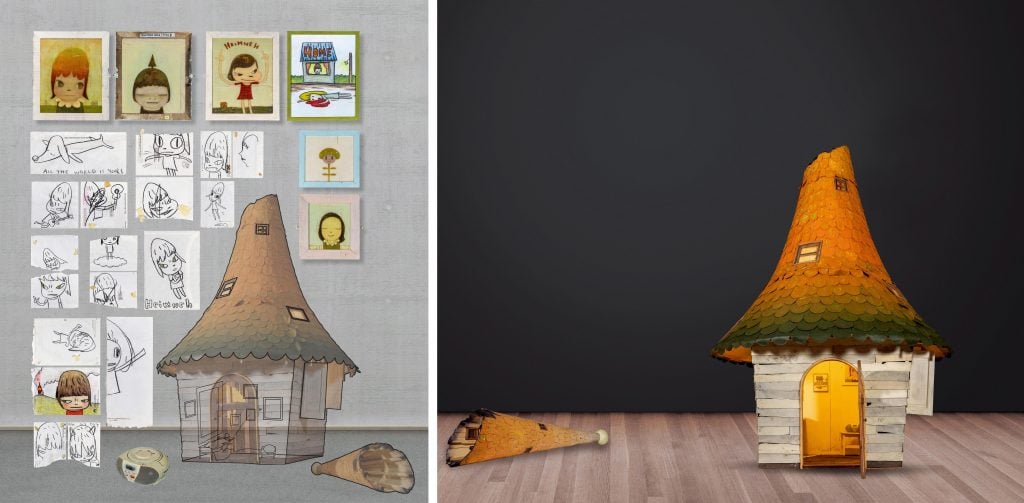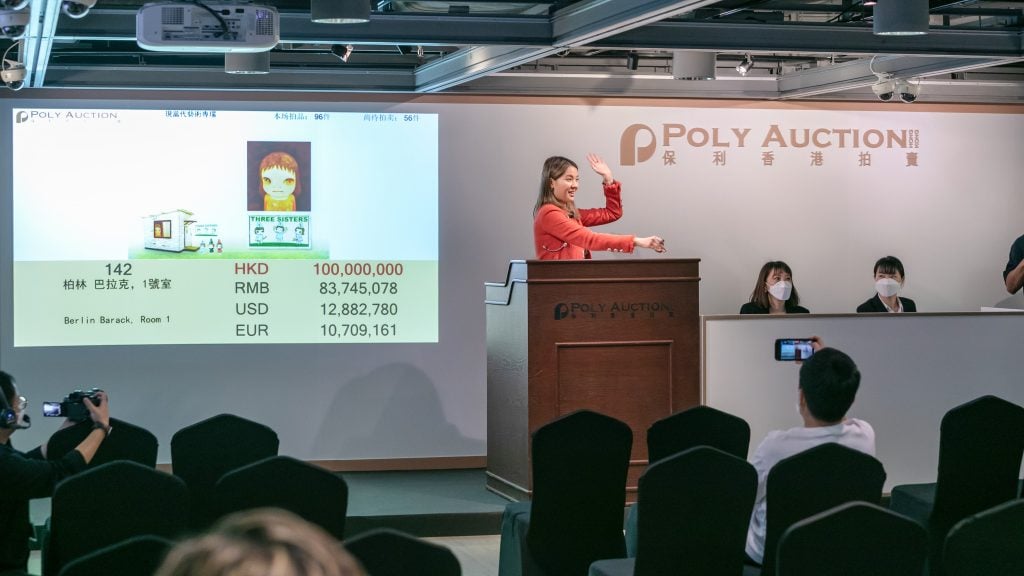Buyer's Guide
6 Questions for Poly Auction Specialist Jamie Yu on a Record-Setting Yoshitomo Nara, and What It Means for His Market
The auction house set a record for a three-dimensional work by the artist in April.

The auction house set a record for a three-dimensional work by the artist in April.

Artnet Gallery Network

Jamie Yu is a rising star of the Honk Kong auction world. As head of the Modern and contemporary art department at Poly Auction Hong Kong, she has ushered in an exciting era for the auction house. In April, Yoshitomo Nara’s Berlin Barack, Room 1 (2007) sold for HK $120 million in Poly’s Modern and contemporary art sale, setting the highest-ever price for a three-dimensional artwork by the artist, and the second-highest auction price for Nara ever. Then in June, a sale coordinated with Philips set 17 new auction records, many for emerging artists.
We caught up with Yu about her trajectory to her current position, why Nara’s Berlin Barack, Room 1 is worth the price tag, and what’s next for the future of Nara’s market.

Yoshitomo Nara, Berlin Barack, Room 1 (2007). Courtesy of Poly Auction Hong Kong.
How did you find your way to becoming the head of modern and contemporary art at Poly Auction Hong Kong?
I majored in fine art for my undergraduate degree and then visual art management in graduate school. After graduating, I first worked for an international auction house for a few years, which provided great training and learning experience. Then I joined Poly Auction Hong Kong and have been dedicated to creating a brand new platform with a different way of thinking. Next year will be our 10th anniversary!
Yoshimoto Nara’s installation Berlin Barack (2007) sold for a record HK $120m (US $15.5m) earlier this year. The installation is a little house with two works inside, Hothouse Doll and Three Sisters (Berlin Version). Can you tell us a little bit about the work and why is it so special?
Most artists are more well known for their oil paintings, but Yoshitomo Nara is quite the exception. He started creating paintings and collages when he was studying in Germany. He later began to work on sculptures and installations.
Installations are one of the most important creations by Yoshitomo Nara. However, many of his creations are specially created for retrospectives or biennales. Therefore, they are not preserved in their entirety, with very few of them entering private collections.
We proudly presented Berlin Barack, Room 1, with two of the largest paintings in a house installation to appear in auction history as of today. This work in particular fully presents the artist’s 30 years of creation. In every way, from the presentation of the work, video production, and the set-up of preview, we gave our best effort to bring the perfect aspect to the audience and collectors.

Yoshimoto Nara, Not Everything but Orange House. Courtesy of Poly Auction Hong Kong.
Did you have any indication that the work would sell this well?
Installation works by Yoshitomo Nara are very rare on the market, to begin with. We set the artist’s world record for Not Everything But / Green House and Not Everything But / Orange House in 2019. Hothouse Doll, which was sold at a joint auction with Phillips last year, fetched the second-highest auction price for the artist. I am glad that Berlin Barack, Room 1, which includes another Hothouse Doll, achieved a very successful result.
What was the bidding battle like on the night of the auction?
The auction of Berlin Barack, Room 1 started at HK$38 million. We received written bids before the auction, and the highest written bid reached HK$70 million. Between the written bid and two telephone bids, this quickly raised the bid to HK$78 million.
The bidding war was mainly among the telephone bidders represented by managing director, Alex Chang, senior specialist Joseph Yang, and me. After 11 rounds of bidding, the price reached HK$95 million. In the end, Alex Chang’s client on the phone won, and it hammered at HK$100 million, ultimately selling at HK$120 million with premium, setting a new world record for the artist’s three-dimensional work and the second-highest auction price for the artist.

Auctioneer Jenny Lok selling Yoshitomo Nara’s Berlin Barack, Room 1.
What does it mean for the future of Nara’s work at auction?
Nara had his 60th birthday the year before last. I am still very confident in the market’s future development of Nara’s works. Based on the extensive range of collectors, his works are at the same price level across auction markets in Hong Kong, Beijing, New York, or London.
Two big exhibitions of Nara’s work recently took place in Dallas and Taipei. Do you think that helped bolster the sale or drew attention to it?
The two exhibitions did not necessarily have any concrete bolstering for a work with such a high price. However, the academic research and analysis on exhibitions, especially large-scale retrospective exhibitions of art museums are very significant for the public to understand the artist’s creative process. It is difficult for an auction house or gallery to fully showcase an artist with several works or even a complete exhibition. Academia and the art market must complement each other to bring the best development for the artist.
What does a record price like this mean for the future of the auction house?
Firstly, it gives existing collectors a lot of confidence. After all, collections and preferences of artworks are very subjective choices. The auction record clearly shows that many bidders are willing to offer high prices for the works, which at the same time creates attraction to the incumbent collectors since there will be a good investment return, which may become an incentive for them to consider selling.